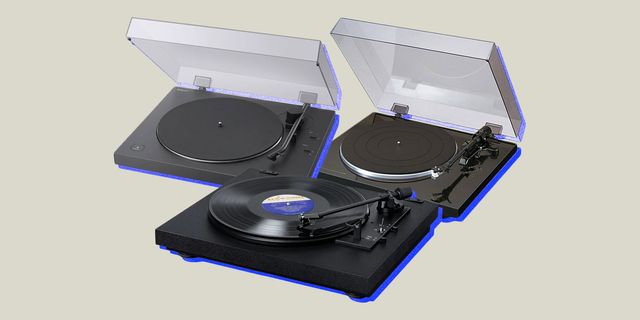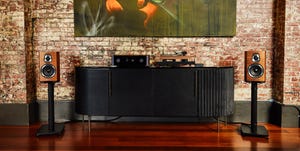Before buying a turntable, there are a bunch of questions you have to ask yourself. How much do you want to spend? Do you want a turntable with a built-in phono preamp or do you want to be able to build out the system with your own amplification and components? What size records will you be playing and what speed(s) will you need the turntable to play?
But after all that one remains: do you want a manual or an automatic turntable? And more importantly, what is even the difference?
What's the difference between a manual and automatic turntable?
In short, a manual turntable is more work, which many vinyl enthusiasts believe is actually the point of playing records. It makes playing the music very deliberate. With a manual turntable, you have to manually lower the tonearm onto the record to start playing and when the record is over, you have to lift the tonearm back into its resting position.
An automatic turntable takes that work away from you. Once you place the record, all you have to do is press a button (or lever) and the tonearm will automatically lower onto the record and then, when the record is over, the tonearm will lift and return back to its resting position. It’s a minor bit of automation but with a big effect; it makes your turntable essentially a press-and-play machine.
There are hybrid turntables, too. A semi-automatic turntable splits the difference by requiring you to place the needle into the groove, but after the album is done, the tonearm will automatically lift and return to its resting position at the end of the record. Most automatic and semi-automatic turntables will also turn off at the end of the record.
What are the advantages of an automatic turntable?
The biggest advantage of an automatic turntable is that you don’t have to worry about placing the stylus. That can be a big relief if you’re just getting into vinyl because you won’t have to worry about missing the edge of the record or placing the stylus cleanly. And it’s important to do so; if done improperly this can scratch and ruin the record, not to mention make a terrible screeching sound in the process.
With an automatic turntable, there’s also less likelihood of you damaging your turntable’s stylus; most automatic turntables have an “auto off” feature that also picks up and returns the tonearm, that way the stylus doesn’t keep riding the record for hours before you realize it’s still on.
Do automatic turntables sound better or worse?
This is a topic of contention. Some people claim that automatic turntables’ abundance of moving parts can actually have a negative effect on the sound quality. There’s also the fact that most audiophiles prefer manual turntables for the simple fact that they like the analog ritual of placing the stylus and having to pay closer attention to the music.
The bottom line, however, is that it comes down to the turntable. If you have a quality turntable and you take care of, it shouldn’t really matter if it’s automatic or manual.
The Best Automatic Turntables
Sony PS-LX310BT
- Fully automatic: Yes
- Cartridge: N/A (MM)
- Built-in phono preamp: Yes (switchable)
- Speeds: 33 or 45 RPMs
The Sony PS-LX310BT is an entry-level turntable that's meant for the non-traditional vinyl enthusiast. It's got all the internal components built right into it — including a built-in preamp — but it's features Bluetooth connectivity, meaning you can stream audio right to your Bluetooth speakers or wireless headphones. Additionally, it has a USB output so you can rip your vinyl records directly to your computer. (Note: the phono cartridge isn't removable and therefor note upgradable. )
Denon DP-300F
- Fully automatic: Yes
- Cartridge: Denon DSN-85
- Built-in phono preamp: Yes (switchable)
- Speeds: 33 or 45 RPMs
The Denon DP-300F is a midrange fully automatic turntable. It comes with a built-in phono preamp, which is switchable in case you want to upgrade down the road. And it comes with Denon's own DSN-85 cartridge, which is also swappable and can be upgraded as well. Other than that, the Denon DP-300F is pretty straightforward turntable with no extra thrills (like USB connectivity). It's designed to be a plug-and-play and then push-to-play turntable.
Pro-Ject Automat A1
- Fully automatic: Yes
- Cartridge: Ortofon OM10
- Built-in phono preamp: Yes (switchable)
- Speeds: 33 or 45 RPMs
The Automat A1 is the Austrian hi-fi company's first and only fully automatic turntable. It's decked out with high-quality components — including an Ortofon OM10 cartridge, 8.3-inch aluminium tonearm, metal platter, wooden chassis and a built-in phono preamp (switchable) — but because it's fully automatic, it's so simple that a vinyl neophyte can easily get it up and running. That said, if you want to take your setup up a notch, you can easily add an external preamp (as the Automat A1's built in one can be switched off) and swap to a higher-end cartridge (maybe a Ortofon's OM20) later on down the road.
Dual CS 429
- Fully automatic: Yes
- Cartridge: Ortofon 2M Red
- Built-in phono preamp: Yes
- Speeds: 33, 45 or 78 RPMs
The Dual CS 429 is a more premium fully automatic turntable. It's equipped with higher-end materials such as a heavy die-cast aluminum platter, a solid MDF plinth, an aluminum tonearm and a Ortofon 2M Red cartridge (which goes for $99 on its own). It has a built-in phono preamp (switchable) and, via RCA inputs, can be connected to most any receiver or amp you have, or even a powered speaker like a Sonos Five or Era 300. The other unique thing is that it can also play 78 RPM records.





























